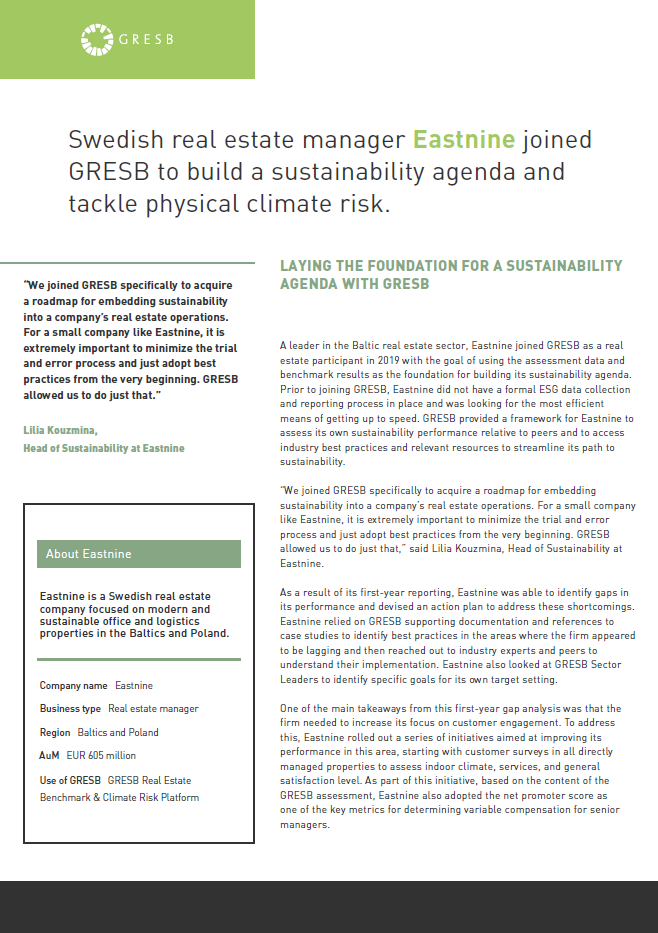Swedish real estate manager Eastnine joined GRESB to build a sustainability agenda and tackle physical climate risk

Eastnine is a Swedish real estate company focused on modern and sustainable office and logistics
properties in the Baltics and Poland.
Business type: Real estate manager
Region: Baltics and Poland
AuM: EUR 605 million
Use of GRESB: GRESB Real Estate Benchmark & Climate Risk Platform
Laying the foundation for a sustainability agenda with GRESB
A leader in the Baltic real estate sector, Eastnine joined GRESB as a real estate participant in 2019 with the goal of using the assessment data and benchmark results as the foundation for building its sustainability agenda. Prior to joining GRESB, Eastnine did not have a formal ESG data collection and reporting process in place and was looking for the most efficient means of getting up t o speed. GRESB provided a framework for Eastnine to assess its own sustainability performance relative to peers and to access industry best practices and relevant resources to streamline its path to sustainability.
“We joined GRESB specifically to acquire a roadmap for embedding sustainability into a company’s real estate operations. For a small company like Eastnine, it is extremely important to minimize the trial and error process and just adopt best practices from the very beginning. GRESB allowed us to do just that,” said Lilia Kouzmina, Head of Sustainability at Eastnine.
As a result of its first-year reporting, Eastnine was able to identify gaps in its performance and devised an action plan t o address these shortcomings. Eastnine relied on GRESB supporting documentation and references to case studies to identify best practices in the areas where the firm appeared
to be lagging and then reached out to industry experts and peers to understand their implementation. Eastnine also looked at GRESB Sector Leaders to identify specific goals f or its own target setting.
One of the main takeaways from this first-year gap analysis was that the firm needed to increase its focus on customer engagement. To address this, Eastnine rolled out a series of initiatives aimed at improving its performance in this area, starting with customer surveys in all directly managed properties to assess indoor climate, services, and general satisfaction level. As part of this initiativ e, based on the c ontent of the GRESB assessment, Eastnine also adopted the net promoter score as one of the key metrics for determining variable compensation for senior managers.
“Our first-year GRESB benchmark report provided the base for our sustainability agenda until the present day. As many initiatives were implemented, the complications, setbacks, or failures arising along the way were an important learning experience for us that greatly expanded our understanding of sustainable real estate operations,” concluded Lilia Kouzmina.
Assessing physical climate risk
Physical climate risk is particularly high on Eastnine’s agenda. With extreme weather events becoming more frequent, the firm sought to gain a better understanding of the exposure of its portfolio to physical climate risk.
GRESB’s Climate Risk Platform helped Eastnine address physical climate risk as part of the pre-acquisition due diligence process. “Access to this type of data during the due diligence process can provide important insights that have the potential to affect pricing and prompt a deeper analysis of the
technical systems in the buildings related to the revealed risks. It can also provide comfort with regard to the level of exposure of the portfolio assets,” said Kouzmina.
When looking at some of its locations, Eastnine found that the data showed elevated risk from river floods which prompted the firm to contact local experts to dig deeper into the data. The resulting analysis revealed that the risk to one of the firm’s buildings in Vilnius, Lithuania, was low, but prompted valuable and timely discussions on building protection against floods and about their impact on adjacent areas, which proved to be a useful learning experience applicable to future investments.
Eastnine also used GRESB’s Climate Risk Platform data as part of its TCFD reporting to describe the physical risks associated with its portfolio. The platform proved to be a very useful tool in helping Eastnine assess the organization’s strategic resilience and the impact of various climate-related risks and opportunities as part of its TCFD disclosures.
Getting started
Real estate managers looking to understand their portfolio’s exposure to physical climate risk can learn more at gresb.com/ClimateRisk.